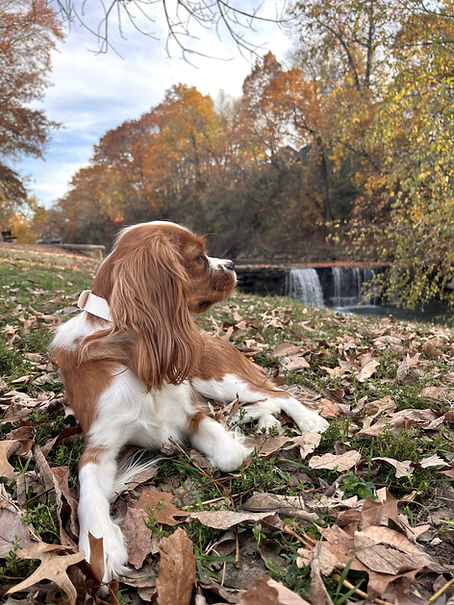
Proudly providing beautiful, healthy Cavalier King Charles Spaniel puppies to happy homes all across America.
About the Breed
What is the Cavalier King Charles Spaniel?
The Cavalier King Charles Spaniel originates from England where they were bred to be lap dogs to the elite, and ruling class and bird hunters flushing out small birds in the fields. They retain their hunting instincts making them enthusiastic playmates, who are equally as happy to be on the couch with their loved ones.
Their large, round eyes, and endearing melting expression, friendly spirit have endeared them to us two-legs for centuries. They are often described as "big dogs in a little package".
AKC Introduction to the
Cavalier King Charles Spaniel


Why the Cavalier King Charles Spaniel?
Cavaliers are affectionate companions, athletic playmates, gentle with children, and maintain a cheerful disposition throughout their lives making them wonderful additions to all kinds of homes. They are known to thrive even in apartment homes. They are non-aggressive, and accommodating to other dogs in the home allowing established pets to settle into life with the CKCS seamlessly.
How do I keep a Cavalier?
There are a few simple things to keep in mind in order to keep your Cavalier at their best physically, mentally, and emotionally.
Here are the most basic categories to remember if caring for a dog is new to you:
1. Nutrition & Hydration
Cavaliers can have sensitive digestive systems. It's best to do your own research to decide on a diet for your
Cavalier. Consulting with your veterinarian and your observations is important. The CKCS tends to be very food motivated so you must take care that your Cavalier isn't overeating & gaining weight which results in health problems.
2. Veterinarian & Health Care
Cavaliers like any other dog should have regular vet visits to their veterinarian 1-2x per year and as needed.
*Pet Insurance is strongly encouraged!
3. Hygiene & Grooming
Cavaliers should be brushed daily, with a more thorough groom & bathe every 4-6 weeks.
Nails should never "click" on the ground and should be clipped every 2-4 weeks along with the hair on the bottoms of their feet.
**It is not recommended to cut their coat, but trimming of the ears, feathers, and tail can reduce grooming for non-show homes or those with mobility challenges.
4. Enrichment & Exercise
Cavaliers are highly adaptable, and can be as happy on an agility course, as they are on the couch. They will need at least 30 minutes/day of exercise to keep them fit, and mentally stimulated. They love to chase, and should be kept on leash or in a securely fenced area as their Spaniel heritage can cause them to "lock in" on a smell, sight, or sound and take of in a chase. Training your Cavalier is crucial to both yours and their fulfillment. Thankfully they're clever little dogs with a desire to please making training a pleasurable experience.
5. Attachment & Security
Cavaliers are not described as an anxious breed, and can be left alone for 4-5 hours without causing them stress. Their pleasant spirit endears them to all those around them. Their companionship is precious, and they seek you out at every opportunity. They should not be kept apart from their human families as their need for connection is strong.
Their adaptability makes them great additions to nearly any home and are by nature agreeable with other dogs. Socialization to new people, places, pets is vital for your Cavalier's confidence and sense of security.
